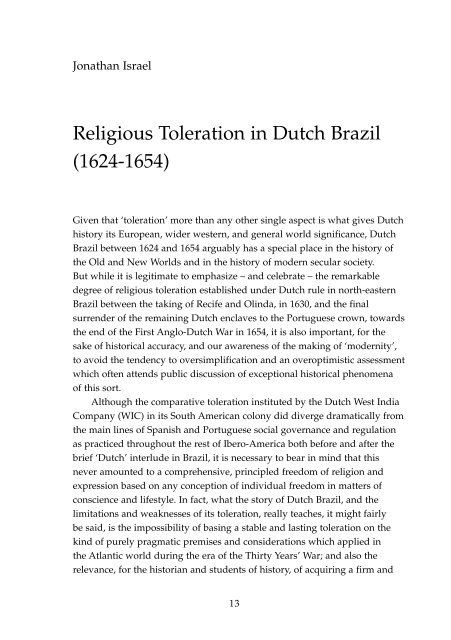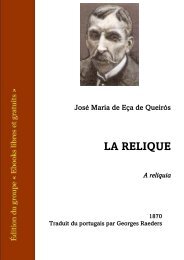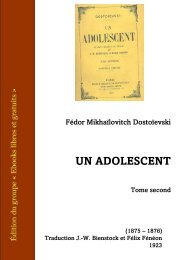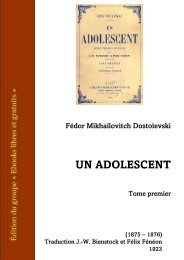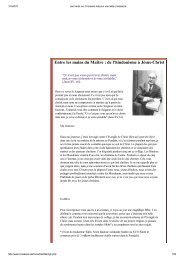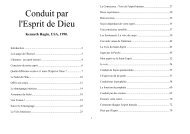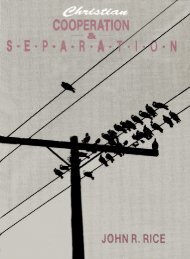The Expansion of tolerance
You also want an ePaper? Increase the reach of your titles
YUMPU automatically turns print PDFs into web optimized ePapers that Google loves.
Jonathan Israel<br />
Religious Toleration in Dutch Brazil<br />
(1624-1654)<br />
Given that ‘toleration’ more than any other single aspect is what gives Dutch<br />
history its European, wider western, and general world significance, Dutch<br />
Brazil between 1624 and 1654 arguably has a special place in the history <strong>of</strong><br />
the Old and New Worlds and in the history <strong>of</strong> modern secular society.<br />
But while it is legitimate to emphasize – and celebrate – the remarkable<br />
degree <strong>of</strong> religious toleration established under Dutch rule in north-eastern<br />
Brazil between the taking <strong>of</strong> Recife and Olinda, in 1630, and the final<br />
surrender <strong>of</strong> the remaining Dutch enclaves to the Portuguese crown, towards<br />
the end <strong>of</strong> the First Anglo-Dutch War in 1654, it is also important, for the<br />
sake <strong>of</strong> historical accuracy, and our awareness <strong>of</strong> the making <strong>of</strong> ‘modernity’,<br />
to avoid the tendency to oversimplification and an overoptimistic assessment<br />
which <strong>of</strong>ten attends public discussion <strong>of</strong> exceptional historical phenomena<br />
<strong>of</strong> this sort.<br />
Although the comparative toleration instituted by the Dutch West India<br />
Company (WIC) in its South American colony did diverge dramatically from<br />
the main lines <strong>of</strong> Spanish and Portuguese social governance and regulation<br />
as practiced throughout the rest <strong>of</strong> Ibero-America both before and after the<br />
brief ‘Dutch’ interlude in Brazil, it is necessary to bear in mind that this<br />
never amounted to a comprehensive, principled freedom <strong>of</strong> religion and<br />
expression based on any conception <strong>of</strong> individual freedom in matters <strong>of</strong><br />
conscience and lifestyle. In fact, what the story <strong>of</strong> Dutch Brazil, and the<br />
limitations and weaknesses <strong>of</strong> its toleration, really teaches, it might fairly<br />
be said, is the impossibility <strong>of</strong> basing a stable and lasting toleration on the<br />
kind <strong>of</strong> purely pragmatic premises and considerations which applied in<br />
the Atlantic world during the era <strong>of</strong> the Thirty Years’ War; and also the<br />
relevance, for the historian and students <strong>of</strong> history, <strong>of</strong> acquiring a firm and<br />
13


